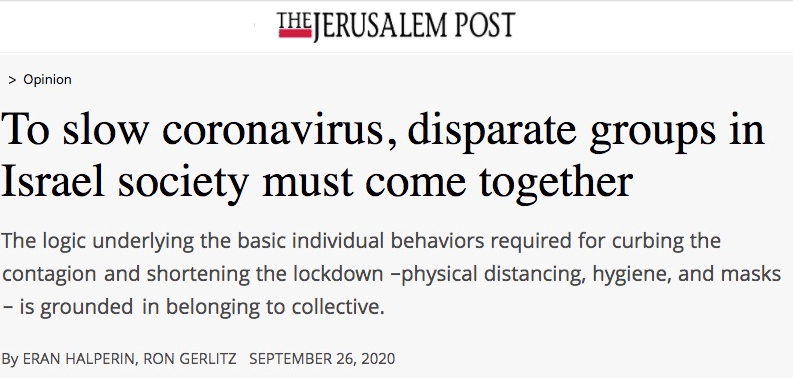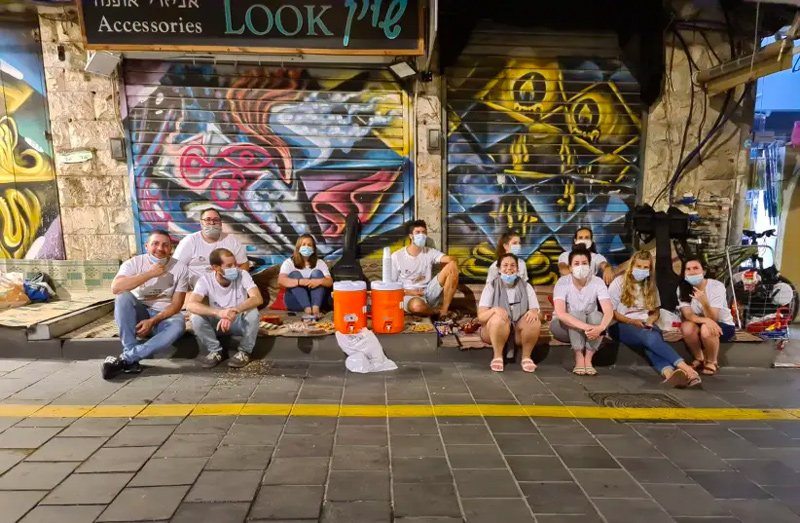Editor’s note: The author of this op-ed is Prof. Eran Halperin: a professor of Social Psychology at Hebrew University, a member of the Public Advisory Board of Magen Israel and Founder and Head of aChord: Social Psychology for Social Change. Co-author Ron Gerlitz is the Executive Director of aChord. Prof. Halperin was recently featured in Psychology Day with his piece, What Do We Talk About When We Talk About Peace?


Israeli society today is closed in, divided up and shut down. This, while facing an unprecedented multidimensional crisis – in public health, the economy, politics, and society. From social psychology theory and research, we know that a crucial source of our resilience (or failure) in coping individually and collectively with such a challenge is our group identity. Moreover, the logic underlying the most basic individual behaviors required for curbing the contagion and shortening the lockdown –physical distancing, hygiene, and masks – is grounded exactly in this sense of belonging to the collective.
Findings from a very recent comparative international study, the largest of its kind, can shed light on this. Over 100 researchers from all over the world (including Prof. Eran Halperin, undersigned, of the Hebrew University of Jerusalem) examined tens of thousands of citizens from 67 countries, among them over 1,200 Israelis, to understand what would most influence their willingness to obey pandemic-related instructions.

The study found that the key factor motivating people to adhere to distancing and hygiene guidelines is the level of their national-group identification; that is, how connected they feel to their national group and how central they consider it in their identity. This was rated above and beyond factors like economic status, ideology, or level of religiosity. This fascinating finding bodes ill for today’s deeply divided Israeli society. Too many groups and citizens do not feel part of the collective and oftentimes are in fact excluded by the state and its representatives. If we do not find ways to strengthen the sense of belonging for all citizens – especially Arabs and the ultra-Orthodox – we will not be able to curb the pandemic.
True, a crisis can provoke deterioration. Yet a crisis can also pose unique opportunities to improve intergroup relations in a divided society. The current health emergency offers a rare opportunity for societies like Israel’s, whose groups are in perpetual conflict. Confronting a common enemy offers a rare chance to formulate a common meta-identity with a shared meta-goal: beating back the pandemic. A unique situation like this one highlights the interdependence among disparate groups. Understanding this interdependence and embracing a common goal can potentially allow for deepening the connection, easing tensions, and creating more tolerant and respectful relations between different groups in society.
At the same time, one consequence of a tangible, life-threatening health emergency like this one, which is now accompanied by a severe economic crisis, is that people tend naturally to turn inward toward their narrower identity groups. Crisis and threat can exacerbate stereotyping and prejudice against members of minority groups, as people look for someone to blame and generally find the culprit in the ‘other’, ‘outsider’ group. Israelis are no different: Ultra-Orthodox are blamed because of their yeshivas and synagogues, the Arabs because of their weddings, secular people and leftists because of their demonstrations, and those on the right because they voted for an incompetent government. “They” are always to blame for the crisis and are responsible for society’s inability to deal with it.

The potential in Israel for improving intergroup relations during the current pandemic has yet to be actualized. Instead, we see a troubling tendency for groups to close ranks and hunker down, increasingly blaming “them” for the worsening Coronavirus contagion and the return of the nationwide lockdown. Intergroup hostility has intensified, weakening any trend toward a shared collective identity to meet the crisis. This dynamic is very destructive, fragmenting society and greatly damaging our ability to stand together against the pandemic.
The quality of leadership and the nature of the public discourse are key factors powering intergroup processes during a crisis; they can push it toward a deterioration in relations or toward greater unity and solidarity. What is occurring in Israel now is not happening in a vacuum – the government and the person leading it have made a crucial contribution. After years of incitement against various constituencies and vilification of this or that group with all kinds of falsehoods, Israeli society is deeply divided as it attempts to confront a crisis that demands cooperative action.
Even with the emergency at its height, the prime minister and some of his cabinet continue to cast blame, much of it spurious, at various groups for behavior leading to greater contagion while attacking the police and officials working around the clock to address the public health emergency and economic crisis facing us. Instead of providing leadership to promote interconnectedness and a sense of shared belonging among all citizens, the present government proffers a dangerous discourse of divisiveness and incitement – contributing directly to people’s waning cooperation with public health directives as the virus spirals out of control.
Because the government is behaving with such blatant irresponsibility, it is now up to the rest of us to change the dynamic. Israeli society faces a historic moment for relations between the different groups that comprise it. The findings we have presented here suggest that we are in a unique situation: Drawing together all the groups in our society is not only a social or economic imperative, but also the only way to overcome the emergency confronting us.
This is a call to all leaders, national and local, to journalists, to those who help shape public opinion, to prominent figures in the business community and otherwise: We all bear a profound responsibility to impart a sense of belonging to members of all social groups – especially Arabs and the ultra-Orthodox. We must stop pointing the finger at one another. We must reiterate that this is a shared emergency, and hence a shared struggle. We must continually remind people of our interdependence, because only together can we get through this. And we must back all that up with actions that can overpower the voices of incitement and divisiveness coming from the government. Only then can Israeli society, collectively, stand against this pandemic and begin to heal.
Halperin is a professor of Social Psychology at the Hebrew University, a member of the Public Advisory Board of Magen Israel and co-chairman of aChord: Social Psychology for Social Change. Gerlitz is executive director of aChord.